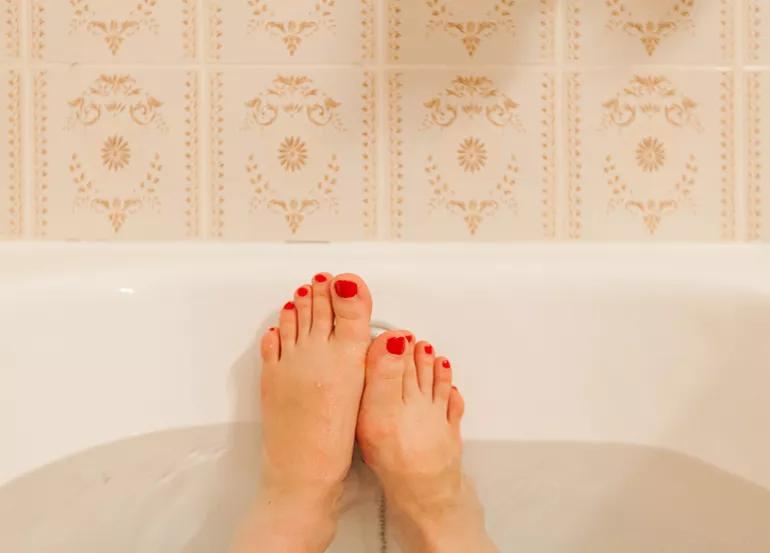Advice for prevention and treatment

Anytime you have pain, bleeding and itching in your anal area, you’re going to worry.
Advertisement
Cleveland Clinic is a non-profit academic medical center. Advertising on our site helps support our mission. We do not endorse non-Cleveland Clinic products or services. Policy
First, these are all uncomfortable sensations — there’s no getting around that. And second, they can be scary and make you wonder, “What’s going on?”
Many patients will assume hemorrhoids are to blame, but colorectal surgeon Massarat Zutshi, MD, says there’s another common culprit behind symptoms such as these: anal fissures.
Anal fissures are small tears in the skin around your anus. They commonly cause itching and bleeding, and they tend to cause more pain than most types of hemorrhoids. When you have these symptoms, a doctor can help you get an accurate diagnosis — and the right kind of relief.
Anal fissures can happen to just about anyone, but there are definitely factors that raise your risk. Constipation is a major one, Dr. Zutshi says. Hard stool and straining on the toilet can put stress on your body and lead to these tears.
The same is true of diarrhea, even though it’s quite different from constipation. “Anytime you have a change in your bowel habits that puts stress on your system, your risk goes up,” she explains. “That’s why we often see people come in with anal fissures after traveling, when changing diets put the digestive system to the test.” Likewise, childbirth and the resulting stress on the body’s muscles and tissues can lead to fissures.
Advertisement
Fortunately, you can take preventive steps to lower your risk. They’re fairly simple:
Drink plenty of water. Hydration helps you avoid constipation.
Take an over-the-counter stool softener to avoid hard, dry bowel movements. Keeping things flowing through your body can help you avoid fissures. This is often good advice after childbirth in particular.
Watch your diet, and make sure you’re getting plenty of fiber and leafy greens. For protein, choose lean meats and fish over red meat. And don’t eliminate all fat from your diet, because fat and oil are good lubricants that keep your digestive tract functioning properly.
First, a doctor will want to rule out other conditions with similar symptoms, as well as abscesses, infections, inflamed skin tags or hemorrhoids — or other more serious concerns, Dr. Zutshi says.
Next, in conjunction with the lifestyle changes outlined above, treatment for a fissure usually starts conservatively with simple at-home fixes and conservative medical therapy.
At home: A “sitz bath” — soaking in warm, but not hot, water several times a day — works wonders for many patients. The pain many people feel before or right after a bowel movement comes from muscle spasms brought on by the anal fissure. Warm baths help those muscles relax, which in turn helps the fissure heal over time.
Medical management: Medical therapy targets the muscles, too. A doctor may offer a specific ointment that relaxes the anal muscles so the fissure can heal, minus the spasms. A numbing agent such as lidocaine is an option, too. However, it may add to the burning and irritation.
Surgical options: When conservative treatments don’t work, there are two simple outpatient surgical options. One is a Botox injection into the anal muscles. This basically paralyzes the muscle to prevent spasms and allow the fissure to heal. The other option is sphincterotomy, a strategic cut to the muscle that also relieves spasms. Both come with a healing time of around two weeks.
The best option comes down to your individual needs, Dr. Zutshi says. For example, a sphincterotomy has a slight risk of causing long-term bowel control issues, so it may not be recommended for people who already have those issues, especially women. The same is true of people with Crohn’s disease or HIV, two groups with an increased risk of anal fissures. For these populations, Botox may be a better option if surgery is required.
The bottom line — no pun intended — is that you have plenty of options to treat this irritating condition. When you suspect an anal fissure, see a doctor to confirm those suspicions and find out which options are best for you.
Advertisement
Advertisement
Learn more about our editorial process.
Advertisement

Anal sex can be safe if you’re prepared for the experience

Dairy, wheat, seafood, nuts and other foods may trigger inflammation

People with an inflamed esophagus may also have other conditions that cause a nagging, persistent cough

You have plenty of options to fill your belly, but caution is required when preparing meals

The conditions have similar symptoms, but are very different

Most of the time, beeturia is a curiosity, not a concern

Eat foods that are high in protein and low in animal fat and simple sugar

Your body naturally produces the protein that’s essential for breaking down and digesting food

If you have other cold and flu symptoms, it’s probably not strep

A cold one out in the cold can cause a false sense of warmth and increase your risk of hypothermia